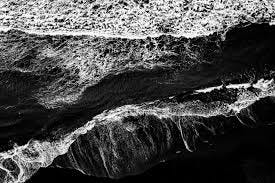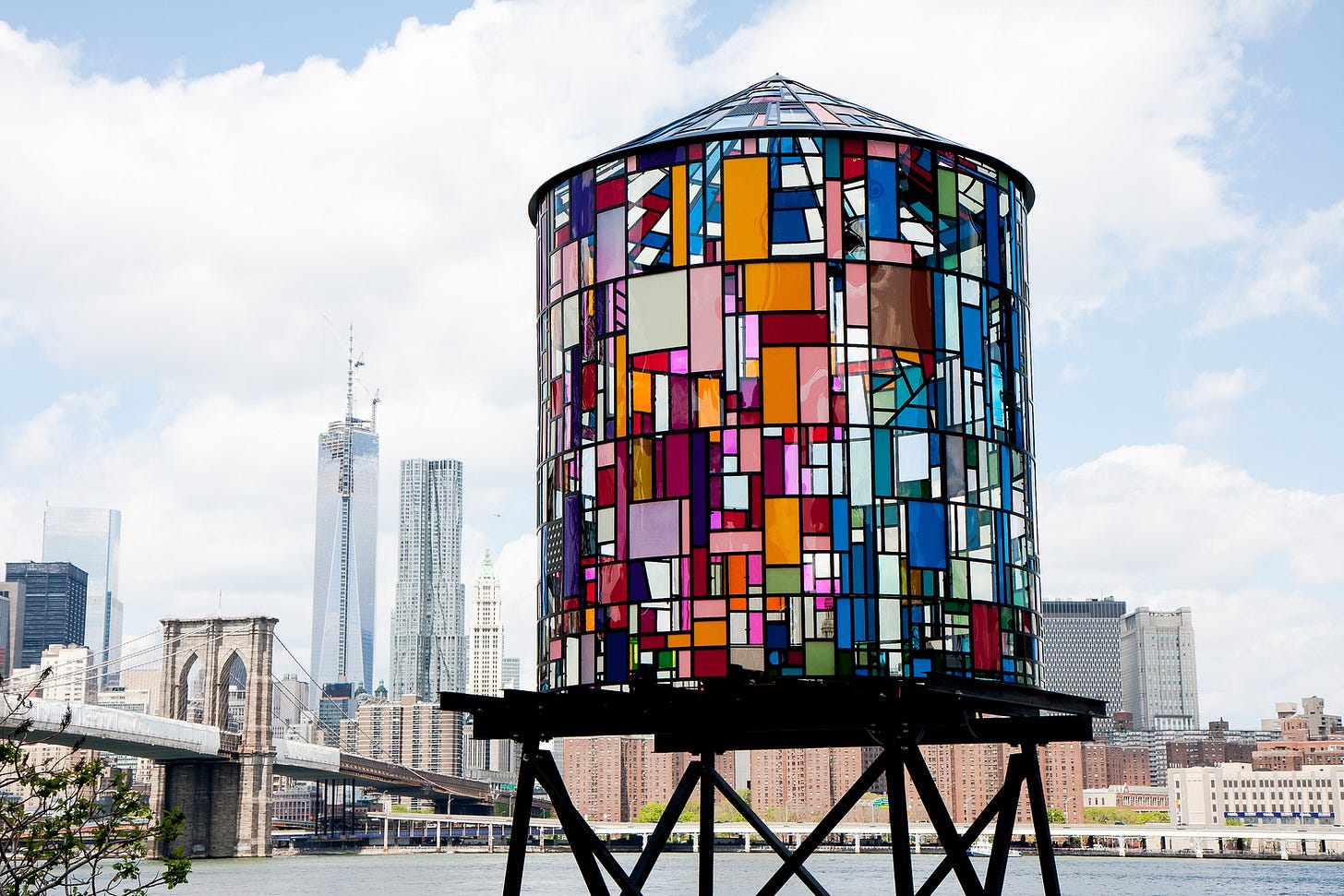The Weight of Water
On writing, privilege, and the weaponization of life’s most essential resource
Oftentimes, the first line will come to me.
I’ll be walking, waiting, pondering, distracted, focused, and it will appear- quiet, usually complete. A sentence with gravity. Most times, I welcome it with excitement. Other times, I stall. I know there are lines that will demand more from me; words that will not let me stay on the surface.
On April 28th, the line was this:
In the car ride from my friend’s Brooklyn Heights apartment back to my own, right before we cross the Brooklyn bridge, there is a stained-glass, multi-colored, kaleidoscope sculpture of a no-longer-functional water tower sitting atop a building. I look at it fondly every ride home.
I knew as soon as I wrote it that it wouldn’t stop there. The rest of the piece began to arrive before I had time to say no; to say that I was nervous and scared, and that I was ashamed to be nervous and scared. But that’s how it happens sometimes—the writing comes like water finding a path through cracked pavement. Even when it makes me uneasy. Especially then. I continued:
Careful eyes will notice similar water towers across the city, though most are plain, wooden, utilitarian, and functional. Some are made more appealing to the eye with painted smiley-faces or stripes, but, for the most part, they blend in without notice in the city’s skyline, silently doing their job.
In New York, water is a quiet assumption. In many buildings, water is included in the rent instead of paying a separate water bill. While our infrastructure is old and sometimes crumbling, it (for the most part) works. When I turn on my sink or shower, I don’t think for a second that water won’t come out of the faucet. I turn a knob, and what I need appears. To brush my teeth. To boil pasta. To take a long shower after a hard day. To clean blood from hands. From clothes. From memories.
As a swimmer, I’ve spent much of my life in water—pools, oceans, lakes. In the hot Iowa summers, our pool was my favorite place. After a long day in the sticky humidity, I would run to jump in the deep end of our own backyard oasis, often all alone, sometimes with friends. I would bob up and down, underwater and above, jumping off the pool floor, gulping in air, and then sinking back under. Over and over.
Throughout most of high school and college, I spent three or four hours a day in the water, staring at the black line at the bottom of a tiled pool, swimming lap after lap after lap.
I love the water. I know the water. I know what it feels like to glide through it, to feel the coolness against my skin, to hear it, to dive in and be immersed, completely surrounded by something that is life itself. Water is a refuge for me, a place of solace and clarity.
And yet, as much as I love water, and for as much time as I’ve spent in it, I rarely think of it. Even less so do I think of water as infrastructure. I hardly think of it at all, until I see that kaleidoscope structure and am reminded. These days, I am reminded more and more, even when I don’t want to be.
The kaleidoscope water tower in Brooklyn is beautiful—made as a reminder of a system that works for us mostly without issue—a system so reliable that they can make sculptures of stained-glass instead of building more functional towers. Other places are not so fortunate. And every time I see that tower, I’m reminded of another place where nonfunctional water towers are a common sight. Where they’ve been bombed, blockaded, and dried up. Where water is controlled as a weapon of war.
In Gaza, the absence of water is not poetic. It is lethal.
I think back to those hot, humid Iowa summers, when we’d spend the good part of a week hosing water to fill our pool. Or, when it rained, we’d turn on the pump and release gallons of water into our yard, just to bring down high water levels. I think of all the swimming pools I’ve dove into over my years of swimming, and how many gallons of water were used to fill and maintain them. I think of myself leaving the sink running as I get distracted listening to a podcast or brushing my teeth.
Over 90% of Gaza’s water is now undrinkable12 — contaminated by sewage, salt, and pollutants. The aquifers that once supplied fresh water are drying up, and the sea encroaches on the cracks, seeping in with every passing year. The desalination plants, built to make the salty water drinkable, are often bombed or left to decay. The pipes that bring what little clean water there is come from Israel, whose government regulates the flow and sometimes cuts it entirely. In many neighborhoods, people survive on less than 3 liters a day, far below the 50–100 liters per person per day recommended by the World Health Organization for basic health needs3.
I think of a family in Gaza. A grandmother, mother, father, and child living together under one roof. (Although, it should be noted, it is now common for generations of Palestinian families to have been wiped out; entire family trees slaughtered. And the few families that do survive may not have a roof under which to live.)
Maybe, years ago, this family would have traveled to the sea, to swim in the shallow waters, to walk along the sand. The father might have waded into the sea, holding the child’s hand, letting them feel the water for the first time, looking back to smile at the mother sitting on the shore. A moment of joy.
That family does not exist in Gaza today. Israel controls most of Gaza's water supply, through pipelines that cross borders and by restricting the entry of materials necessary to repair or maintain water infrastructure. It also controls the entry of humanitarian aid, including water purification tablets, fuel for water pumps, chlorine, and plastic piping4. In October 2023, Israeli authorities cut off all water to Gaza completely56. Since then, water access has been periodically and unpredictably restored—but never enough, and never for long. The result is a system of profound vulnerability, where what should be a fundamental right becomes a privilege—one dependent on access and on politics. The UN has warned of “imminent famine” and a full-scale public health collapse. Diarrheal disease, dehydration, and waterborne infections are on the rise—especially among children.
Perhaps today the grandmother still tries to conserve a few precious liters each day—saving what little they have for the child. Perhaps the mother heats a small pot of water to sponge bathe the baby, careful not to spill a drop. Maybe they collect rainwater in old jugs. Maybe they pray for rain. Perhaps the father walks miles with empty containers, hoping the distribution trucks haven’t run dry, or that today may be the day, after more than 10 weeks, that Israel allows aid into Gaza.
I acknowledge the complex and deeply entrenched political realities that shape the situation in Gaza, but it is essential to remember that the human suffering described here is not a product of abstract political strategy or "collateral damage." While Israel's security concerns are often cited as justification for its actions, the weaponization of water—and other basic necessities—represents a deliberate and disproportionate response to that concern. A blockade of humanitarian aid, whether blocked by Hamas in the past (as is often the reply by some when they hear of the current famine) or restricted by Israeli authorities for the past months, does not lessen the responsibility to protect the fundamental rights of civilians.
We cannot reduce an ongoing human catastrophe to a simple geopolitical game of blame. At the heart of this crisis is a desperate, vulnerable population denied access to something as fundamental as clean water—a necessity that transcends politics and should be safeguarded by all parties, regardless of their stance.
This should horrify us—regardless of politics, religion, nationality, or anything else. No child’s thirst is a justified consequence. No grandmother should have to beg the sky for rain. Humanitarian crises are not about punishment or desert; they are tests of our shared humanity. In Gaza, water has been weaponized—deliberately and systematically. To use water—the most basic necessity for life—as a tool of control and coercion is to desecrate its very purpose. And to witness that desecration in silence is to become complicit in it.
I think of what it must be like to ration thirst. To negotiate whose need is greatest. To choose between washing a wound and quenching a child’s parched lips. I think of how water, which once meant joy and release for me, now means calculation, risk, and sacrifice for them.
And I think of how violence rearranges our associations. How something once soft, essential, and fluid becomes scarce and terrifying. In Gaza, water does not signify comfort or life. It signifies survival.
Now, when I ride home from Brooklyn Heights and see the stained-glass water tower catching the city’s light, its presence unnecessary but beautiful, I look at it differently.
What once felt whimsical now feels fragile—a monument to abundance. To the luxury of forgetting. To the privilege of not thinking about water unless we choose to.
I still find it beautiful. But now, that beauty aches.
I know that, not far from here, there are people who dream of taps that run, of children who don’t go to bed thirsty, and of water that doesn’t come at the cost of dignity, or freedom, or life.
It is the least we can do to pay attention, to be aware. To rememer that water, like justice, is meant to move- to keep systems alive, to respond, and to reach everyone, not just the privileged. When it doesn’t, we have to ask: who’s holding it back? And who among us is willing to help it flow again?
With Care,
Clare
A Song on the End of the World
Czeslaw Milosz
On the day the world ends
A bee circles a clover,
A fisherman mends a glimmering net.
Happy porpoises jump in the sea,
By the rainspout young sparrows are playing
And the snake is gold-skinned as it should always be.
On the day the world ends
Women walk through the fields under their umbrellas,
A drunkard grows sleepy at the edge of a lawn,
Vegetable peddlers shout in the street
And a yellow-sailed boat comes nearer the island,
The voice of a violin lasts in the air
And leads into a starry night.
And those who expected lightning and thunder
Are disappointed.
And those who expected signs and archangels’ trumps
Do not believe it is happening now.
As long as the sun and the moon are above,
As long as the bumblebee visits a rose,
As long as rosy infants are born
No one believes it is happening now.
Only a white-haired old man, who would be a prophet
Yet is not a prophet, for he’s much too busy,
Repeats while he binds his tomatoes:
There will be no other end of the world,
There will be no other end of the world.
Warsaw, 1944
©️ Clare Culver 2025
https://www.pbs.org/newshour/world/in-gazas-widening-humanitarian-crisis-water-access-becomes-dire#:~:text=The%20accepted%20international%20emergency%20threshold,usual%20production%2C%E2%80%9D%20Crickx%20said., https://emergency.unhcr.org/emergency-assistance/water-sanitation-and-hygiene/wash-emergencies




